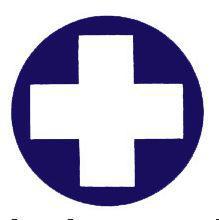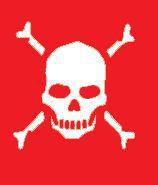SAS Urban Survival Handbook (116 page)
Read SAS Urban Survival Handbook Online
Authors: John Wiseman
Tags: #Health & Fitness, #Reference, #Survival, #Fiction, #Safety, #Self-Help, #Personal & Practical Guides, #General, #Survival Skills
HYPOTHERMIA
Hypothermia is a killer, particularly for elderly people. Initial signs are clumsiness, disorientation and drowsiness. As cooling of body temperature progresses, the individual becomes less active, paler and may become deeply comatose. Rewarm the casualty’s body around the ribs and heart first to increase the ‘core’ temperature—NOT the extremities. If casualty is conscious, give a warm sweet drink. Seek urgent medical attention (see also HEALTH: Save a life!).
12
Health
Maintaining your health is largely down to common sense, but may be difficult against constant city stresses. Judging the seriousness of an injury or illness and knowing how to apply first aid may help you to save a life.
TAKE CONTROL
Monitor your health • Preventative medicine • You and your doctor • Alternatives
• Coping with illness
CHILDHOOD DISEASES
SERIOUS DISEASES/DISORDERS
Heart disease • Cancer • Leukaemia • Multiple sclerosis
• Epilepsy • Diabetes mellitus
GENETIC DISORDERS
Cystic fibrosis • Haemophilia • Huntington’s chorea • Muscular dystrophy
• Sickle-cell anaemia
RESPIRATORY PROBLEMS
Asthma • Pneumonia • TB • Hyperventilation • Bronchitis
EATING DISORDERS
FOOD HYGIENE
Animals and food • Food poisoning
TROPICAL DISEASES
Cholera • Malaria • Typhoid • Typhus • Yellow fever
STDS
Safe sex • AIDS • Candidiasis • Herpes • Genital warts • Gonorrhoea • Syphilis • Hepatitis B
PARASITES
PETS AND YOUR HEALTH
Pregnancy and pets • Allergies • Zoonoses
BITES/STINGS
SUBSTANCE ABUSE
Overdose symptoms • Alcohol dependence ● Tobacco • Coffee/tea
EMERGENCIES
Hard-to-recognize health crises
SAVE A LIFE!
Vital first-aid techniques
TAKE CONTROL
 The prime responsibility for your health rests with you. True, not everyone has an ideal start in life—poverty, poor housing, family break-up, and the possibility of inherited disease or handicap may mean that from
The prime responsibility for your health rests with you. True, not everyone has an ideal start in life—poverty, poor housing, family break-up, and the possibility of inherited disease or handicap may mean that from
birth onwards your health has been affected by factors that are totally beyond your control.
In addition, you are at the mercy of an environment that includes atmospheric pollution, passive smoking, and over-processed foods contaminated by pesticides and additives. You may have little or no control over where you live and the kind of work you do.
Health advice always makes it sound as though all you have to do is follow some simple rules and you’ll be fit, healthy, and live to a ripe old age. All the same, everyone can do a great deal to improve or maintain the best possible level of health. Inform yourself about the way your body works. Recognize and act upon any changes you observe, which might indicate that something is going wrong.
Self-neglect—whether caused by an unwillingness to recognize the possibility of disease or the mistaken assumption that your symptoms are too trivial to ‘bother the doctor’ with—may result in a worsening of the condition, serious permanent disability, or even death.
A positive approach—taking advantage of the many sources of information and advice provided by the media, coupled with a determination to seek professional help without delay when you’re worried about your health—can reduce the risks of serious illness and premature death. Such an approach may also slow down the aging process, enabling you to look forward to an active and independent life well beyond the age of 70.
It’s up to you
Taking responsibility for your health may involve some quite drastic changes in your lifestyle! Change is never easy. The important first step is to decide that you WILL adopt a healthier diet, take more exercise, stop smoking, cut out or cut down on alcohol—but don’t try to do it all at once. Gradual change is far easier to accept than a ‘blitzkrieg’ approach. Each change will bring its own reward, encouraging you to embark upon the next.
It’s far better to admit that it might take a year or so to reach your target of optimum health, than to try to change habits of a lifetime—depriving yourself of some of the props that have seemed to keep you going—and become a ‘new’ person overnight. A rushed approach can lead to failure, discouragement and unwillingness to try again. Ill-advised dietary changes, sudden exercise or stopping regular medication may have serious side effects. Always seek medical advice before making a change in lifestyle.
Looking after yourself is no longer an option. It’s a necessity. Around the world delays in hospital consultations, the expense of treatment, shortages of beds and medical supplies have made us realize that most health systems just can’t cope.
HEALTH CHECK LIST
There are many very basic ways in which you can influence your own health. You’ve seen them hundreds of times, to the point where we cease to pay attention. Read them again!
- ◑
Eat sensibly. Make sure you have a balanced diet, limiting fats and increasing fibre. Medical opinion does not favour vitamin and mineral supplements unless they have been prescribed. - ◑
Don′t drink alcohol or keep your alcohol consumption to a minimum. Alcohol affects your general health and commonly leads to irreversible damage to the heart, liver, brain and nervous system. - ◑
Don′t smoke! It is a major cause of general ill health and commonly leads to lung cancer, heart disease and chronic bronchitis, among other disorders. Your cigarette smoke can also harm other people. - ◑
Take exercise. It will improve and maintain physical and mental fitness. Match it to your age and condition and choose a form that you enjoy. Seek medical advice. - ◑
Watch your weight. Join a club if you find self-restraint is difficult! Seek medical advice. - ◑
Reduce stress. Stress is linked to many serious illnesses/disorders. Talk through your problems with family, friends, employers or professional counsellors. Learn relaxation techniques. Make whatever adjustments you can to your lifestyle.
Gone are the days of the traditional family doctor with ‘all the time in the world’ to solve your health and personal problems. The doctor’s receptionist alone may put you off making an appointment. Now is the time to decide that you will take some responsibility for your own health. Your first response must NOT be to totally abandon hope that your doctor can and will help you. Nor should it be to rush to pharmacies and ‘health’ shops to dose yourself up with over-the-counter medicines!
PLEASE NOTE
This section is intended to provide guidelines, advice and information. It can’t offer actual diagnoses or prescribe treatments, but it may help you recognize and deal with some common conditions and serious emergencies. DON’T use it as a hypochondriac’s handbook!
PREVENTATIVE MEDICINE
 In recent years medical and technical advances have been made in the early diagnosis of illness—in many cases the earlier a problem is
In recent years medical and technical advances have been made in the early diagnosis of illness—in many cases the earlier a problem is
treated, the more successful the treatment. Immunization against certain illnesses has become routine, so that many life-threatening conditions have been almost eliminated.
Screening
Some types of screening, such as checking your weight or blood pressure, may be undertaken by your doctor. Certain groups of people are routinely specifically screened—for instance, pregnant women, newborn babies, people over 75. Those in particular racial groups, people who have relatives with certain serious disorders, and people who work in hazardous conditions should receive special screening.
You can carry out some types of screening on yourself. Some cancers in their early stages appear as small ‘lumps’—self-examination of breasts or testes (for instance) for lumps or growths at regular intervals is ESSENTIAL. A doctor or nurse will demonstrate the techniques.
Women have been encouraged, for many years now, to check their breasts for any abnormalities and to report vaginal or abdominal discomfort. Many men do NOT realize that testicular cancer is increasingly common. The best time to examine the testes is in a warm bath—the scrotum is relaxed, allowing free movement of the testes.
Basic screening options
Antenatal screening
- ◑ Blood group
- ◑ Anaemia
- ◑ Haemophilia (high-risk groups)
- ◑ Rubella
- ◑ Spina bifida (and other congenital defects)
- ◑ Hepatitis B, HIV infection (high-risk groups)
- ◑ Syphilis
- ◑ Chromosomal abnormalities (high-risk groups)
- ◑ Sickle-cell disorders (high-risk groups)
ANAEMIA
Anaemia is surprisingly common, yet people may suffer for years without knowing what is wrong. The name describes a condition where the number of haemoglobin molecules in red blood cells is below normal. Haemoglobin carries oxygen from the lungs to the tissues of the body. Anaemia is usually caused by iron deficiency—iron is an essential component of haemoglobin.
Minor bleeding, such as menstrual blood loss, causes levels of haemoglobin and iron to decrease, but is not usually harmful. However, although pregnancy stops menstrual blood loss, greater drains are made on iron levels by the developing foetus. Pregnant women are particularly at risk from anaemia. SYMPTOMS: Lethargy, tiredness, headaches, brittle nails, pallor, breathing difficulties during exercise, dizziness and pain in the chest.
ACTION: Seek medical assistance. Foods with good sources of iron are fruit, green vegetables, wholemeal bread, lean meat and beans. Iron supplements are available, but should be taken under medical supervision. An excess of iron in the body is also undesirable.

WARNING
Adult-strength iron tablets, which look like ‘sweets’, can be extremely dangerous if swallowed by a child. Seek medical attention at once, if this occurs.
Infant and child screening
- ◑ Heart disease (congenital)
- ◑ Hypothyroidism
- ◑ Cataracts/visual defects
- ◑ Deafness
- ◑ Sickle-cell (high-risk groups)
- ◑ Testes (displaced or undescended)
- ◑ Hip dislocation
- ◑ Dental caries (tooth decay)
Adult screening
- ◑ Cervical cancer
- ◑ Breast cancer
- ◑ Testicular cancer
- ◑ Lung cancer
- ◑ Blood pressure
- ◑ Cholesterol
- ◑ Glaucoma/visual defects